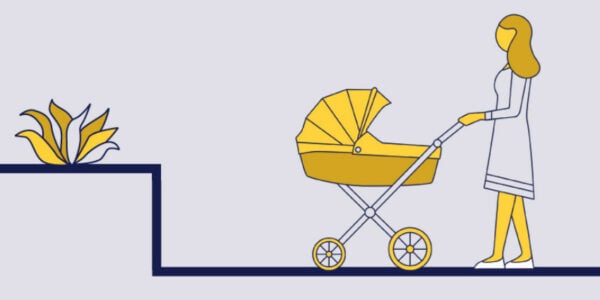Introduction
All professionals involved in the family justice system have long been aware that some parents will experience more than one set of care proceedings. Some parents return to court on many occasions and lose multiple children to public or kinship care, or to adoption. This cycle of returning to court and having subsequent children removed is now commonly referred to as ‘recurrent care proceedings’.
There is a growing body of research providing evidence of the prevalence of recurrent proceedings in England and Wales, the circumstances of the mothers and fathers who experience recurrent proceedings, and the impact on them of having children removed in this way. There is also growing evidence from evaluations and from a recent mapping study of the range of services now in existence to support parents who have experienced, or are at risk of experiencing, recurrent proceedings. The evaluations also provide an insight into effective ways of working with parents who have experienced recurrent proceedings. The mapping and evaluations also highlight the gaps in provision for fathers. Most services focused initially on mothers, and although an increasing number of services work with couples, there is little provision specifically for fathers. This briefing note brings together the key messages from this research. It also raises points for reflection for family justice practitioners about the response to mothers and fathers who experience recurrent proceedings.
A family justice system that removes the fourth, fifth or sixth child from families without doing anything about the reasons for removal is a failing system.Nicholas Crichton, founder and champion of the Family Drug and Alcohol Court, cited by Fouzder in Law Society Gazette 2018.
Five key areas
1. Prevalence
In 2015, findings from a landmark study using data collected by Cafcass provided the first evidence about the prevalence of recurrent care proceedings for mothers in England (Broadhurst et al.). Subsequent studies using Cafcass and Cafcass Cymru data have provided evidence about the prevalence of recurrent care proceedings for mothers in Wales (Alrouh, Broadhurst, and Cusworth 2020) and for fathers in England (Bedston et al. 2019; Philip et al. 2020). These studies were designed to complement the research into recurrence affecting mothers in England, and the study relating to fathers was the first to look in detail at fathers in care proceedings. The studies established that one in four mothers is at risk of reappearing in care proceedings following an initial set of proceedings within seven years in England and within eight years in Wales, although the likelihood of a mother experiencing repeat proceedings is greatest within the first three years. Fathers are also likely to experience recurrent care proceedings, although at nearly half the rate of mothers, with around one in eight fathers in England at risk of appearing in subsequent care proceedings within five years.
Other key points from these studies are:
- the younger a mother is when she first becomes pregnant, the more risk there is of her becoming subject to recurrent proceedings
- fathers who become fathers at a young age are also more likely to experience recurrent proceedings
- for both mothers and fathers, the younger the age of the child at removal, the greater the likelihood of recurrent proceedings
- fathers are more likely than mothers to be with the same partner in subsequent care proceedings, with three out of four fathers returning to court with the same partner
- mothers, in contrast, are more likely to be lone parents or with a new partner in subsequent proceedings.
Relevant to the issue of parents experiencing recurrent care proceedings are the findings from separate research looking at the rise in the number of newborn babies (babies under one week old in England, and under two weeks old in Wales) becoming the subject of care proceedings (Broadhurst et al. 2018; Alrouh et al. 2019). These studies, also based on Cafcass and Cafcass Cymru data, have established that while the proportion of care proceedings involving babies under a year old has remained similar over the years, the proportion of newborn babies within that group has risen from 32% to 42% in England (2007 to 2017) and 40% to 52% in Wales (2008 to 2018). The number of cases has also increased over this period. This research also established that, on average, 47% (England) and 49% (Wales) of newborn babies subject to care proceedings were children born to mothers who had previous children subject to proceedings in the five years prior to the study start.
Points for reflection
- What is the situation in your area in relation to recurrent care proceedings?
- What do you know about fathers and recurrent care proceedings locally?
- If data is not currently available, have there been discussions with local authorities and Cafcass or Cafcass Cymru in relation to analysing local data?
- Is the issue of recurrent proceedings discussed at your local Family Justice Board?
- Are there other multi-agency forums where it could be discussed?
2. Circumstances of parents
The qualitative evidence from the studies looking at recurrence (Broadhurst et al. 2017; Alrouh, Broadhurst, and Cusworth 2020; Philip et al. 2021) indicate that mothers and fathers who experience recurrent care proceedings share many characteristics with each other and with other vulnerable parents who are involved in care proceedings— they have experienced significant and multiple adverse experiences in their own childhoods, and are likely themselves to have been in the care system as children. The study relating to fathers (Philip et al. 2021) found that fathers who experienced recurrent proceedings were more likely than other fathers in care proceedings to have had these experiences. The studies focused on mothers did not compare mothers who experienced recurrent proceedings with other mothers in care proceedings but did find that a high proportion of
the mothers involved in recurrent proceedings had experienced multiple adverse experiences in childhood. These adverse experiences include abuse and neglect, exposure to domestic abuse, loss, rejection, and instability in living arrangements— both when with their families and when in the care system.
There has long been an understanding that such adverse experiences in childhood increase the likelihood of poor outcomes in adulthood in relation to health, mental health, and substance misuse (Felitti 2002). Mothers and fathers who experience recurrent care proceedings are likely to have long-standing physical and mental health problems, and the issues that give rise to the concerns about harm to their children commonly include substance misuse, mental health problems, and domestic abuse (Broadhurst et al. 2017; Philip et al. 2021). These studies also show high levels of problems with housing, and the study relating to fathers, together with other recent research, highlights the significance of poverty and economic instability for mothers and fathers in care proceedings (Philip et al. 2021; Bywaters et al. 2016).
For mothers and fathers who are involved in recurrent care proceedings, the pattern of adverse experiences throughout childhood and into adulthood means that many of them are dealing with complex and unresolved trauma, which is then compounded by the trauma of having their children removed through care proceedings. The impact of such trauma and adversity often also leads to parents falling through the nets of support and being seen as ‘hard to reach’ or ‘difficult to engage’. For fathers there is the additional problem that they are more likely to be quickly identified as ‘risky’ rather than vulnerable. As a result, parents can miss out on family support services for themselves and their children, on treatment services for substance misuse, on mental health services, and on attention to physical health problems, including sexual health. There is growing realisation that the ‘failure to engage’ is more a question of services and professionals needing to do more to reach out and engage with people in trauma-informed ways (Mason, Taggart, and Broadhurst 2020; Taggart, Mason, and Webb 2020). This issue is covered in more detail in the ‘Effective ways of working’ section.
Points for reflection
- Are family justice professionals in your area familiar with complex trauma and its impact?
- Is ‘non-engagement’ by parents a factor presented in the evidence by professionals in care proceedings? Is this label ever challenged?
- What evidence is there of professionals attempting to engage parents in ways that take account of their trauma histories?
- Is attention paid to the impact of poverty on parents in the evidence of professionals in care proceedings?
3. Impact of removal
The two studies on recurrence in relation to mothers in England and Wales (Broadhurst et al. 2017; Alrouh, Broadhurst, and Cusworth 2020) indicate that subsequent proceedings are likely to start when the child is much younger than is the case in the initial proceedings, and that the proceedings are likely to be dealt with more quickly. All the studies (Broadhurst et al. 2017; Alrouh, Broadhurst, and Cusworth 2020; Philip et al. 2021) found that the gap between proceedings can often be very short and it is not unusual for subsequent proceedings to be issued before the end of the first set of proceedings. There is also evidence that the children who are the subject of recurrent care proceedings are more likely to be adopted than children in the initial set of proceedings, presumably linked to the fact that they are more likely to be babies. All the studies found that if children were adopted at the end of proceedings, this was more likely to be followed by a further experience of recurrent proceedings.
The evidence that subsequent proceedings are more likely to be concerned with babies, and that nearly half of applications concerning newborn babies involve mothers who have had previous involvement in care proceedings, means that the mothers and fathers caught up in recurrent proceedings will be involved in pre-birth assessment processes. There is no national guidance on pre- birth assessments (Broadhurst et al. 2018) and a literature review linked to the Born into Care studies and other research (Mason, Robertson, and Broadhurst 2019; Lushey et al. 2017) has shown wide variation in practice by local authorities and health partners across England and Wales in relation to pre-birth assessment. These variations relate to the timing and duration of assessments and the extent to which assessments include specialist intervention and support, among other factors. There are also differences in whether the focus is on the parents’ history rather than on changes already made by the parents, or on their potential to change (Ryan 2020). Concerns about pre-birth assessment practice have been raised in a number of judgments considering the removal of babies from their parents (Ryan and Cook 2019).
The removal of a child through care proceedings is a traumatic event in itself, which often exacerbates the parents’ existing difficulties (Broadhurst and Mason 2019; Philip et al. 2020). Mothers and fathers experience grief, guilt, shame, stigma and isolation following the removal of their child. Existing mental health problems can be exacerbated, along with problems with alcohol or drugs, and in addition parents are likely to experience the impact of a reduction in welfare benefits and on occasion may lose their housing as a result (Broadhurst and Mason 2019; Philip et al. 2021). Mothers and fathers who have had previous children removed are aware that any future pregnancy will be subject to child protection procedures and they are fearful of being judged negatively and lack trust in social workers. There is little evidence of this leading to a reluctance to disclose that they are pregnant but there is evidence of mothers and/or couples proactively seeking children’s social care involvement in order to maximise their opportunities to demonstrate change and improve their chances of keeping their unborn baby (Mason, Robertson, and Broadhurst 2019; Philip et al. 2020; Griffiths et al. 2020).
The removal of their children does not mean that mothers and fathers cease to think of themselves as parents—their status of parenthood remains important to them, even though it is invisible to those around them. Many mothers and fathers look forward to a time when they may be reconnected with their children and many want to become parents again in the future. The evidence suggests that recognition of this ongoing maternal and paternal identity is an important motivator for change (Broadhurst et al. 2020; Morriss 2018; Philip et al. 2021).
Points for reflection
- Do you know what the pre-birth assessment practice is locally?
- Do you think pre-birth assessments take place over a sufficient period of time?
- Is there a focus on intervention, rather than just on assessment?
- How much are fathers included in pre-birth assessments?
- How much does the past history of the parent affect the evidence provided and the outcome of the proceedings?
- Expert assessments often recommend specific psychological or other support for parents. To what extent do mothers and fathers receive such support once proceedings are finished?
4. Services designed to respond to the issue of recurrent care proceedings
A deep concern about seeing the same parents in subsequent care proceedings, and removing further children from them because the factors leading to the need for a care order had not been tackled, inspired the late Nicholas Crichton to set up the first Family Drug and Alcohol Court (FDAC) in 2008. In 2012, the London FDAC specialist team brought together a group of academics and practitioners to discuss the issue of recurrent proceedings, share examples of good practice and highlight services being set up specifically to address the problem. A second meeting of this ‘community of interest’ took place in 2014. At this time a number of other initiatives were being set up in Suffolk, Brighton, Reading, Salford, Nottingham and Hackney. Among these early initiatives, FDAC (https://fdac.org.uk/) and Pause (https://www.pause.org.uk/), which began with a pilot in Hackney in 2013, have the highest profile but many of the others are still in existence, and other services across England and Wales have been developed since. Nevertheless, services are still relatively few in number, and the majority of them are small in scale. Most services initially focused on mothers, although many more are now recognising the importance of working with couples. Very few have been set up to work specifically with fathers. As new services reaching out in new ways to parents, they are very vulnerable to budget cuts arising from austerity.
Despite many similarities in the experiences of mothers and fathers involved in recurrent proceedings, they are not a homogenous group. They experience different combinations of difficulties and different pathways though children’s services and the family justice system.
Appropriately, the services that have been set up to provide support to parents who have experienced recurrent care proceedings are working with parents at different points of their lives after their children have been removed from their care:
- some services work with parents pre-birth, supporting them through a pregnancy, helping them achieve the changes necessary to keep their future children safely in their care
- some work with parents who are going through care proceedings once again, supporting them during the process, and helping them achieve the necessary changes to their lives
- some work with parents who are not pregnant and no longer have their children in their care, to help them come to terms with their loss and rebuild their lives
- some focus on younger parents, particularly care leavers
- some focus on mothers only, some work with couples, but very few are specifically for fathers
- some support parents before, during, and after care proceedings.
In 2020 Research in Practice, working in partnership with Pause, Nuffield Family Justice Observatory, and the universities of Lancaster and Essex (funded by Public Health England), set up an online community of practice for services working with parents who have experienced more than one set of care proceedings. The Supporting Parents Community of Practice website (https://supportingparents.researchinpractice.org.uk/) contains a wide range of research and practice information, including resources such as videos, podcasts, links to research and policy publications, and a registry and map of services. The findings of a recent service mapping exercise are to be published shortly (Mason and Wilkinson, forthcoming).
Points for reflection
- Do you know whether any such services exist in your area?
- Do you know what the referral criteria for such services are?
- Are there opportunities for the providers of the service and the parents who have benefited from the service to talk about the work to judges, magistrates, Cafcass, Cafcass Cymru, lawyers, and others involved in the family justice system?
5. Effective ways of working
Evaluations of services that work with parents who have experienced recurrent care proceedings in England and Wales are helpful in demonstrating approaches and ways of working that are effective in supporting and engaging parents (Harwin et al. 2016; Harwin, Ryan, and Broadhurst 2018; Learning and Work Institute 2016; Bellew and Peeran 2017; Cox et al. 2017, 2020; Roberts et al. 2018; Boddy et al. 2020). The key messages from these evaluations are supported by the findings from the qualitative elements of the studies into recurrent care proceedings (Broadhurst et al. 2017; Philip et al. 2020).
A resource pack containing research information, practice tips, and case studies has been developed for areas wishing to set up services for parents who have experienced recurrent proceedings (Research in Practice 2019). Mason and Wilkinson’s recent mapping of services provides helpful detail about effective ways of working (forthcoming), and further resources are available from the Supporting Parents Community of Practice website (https://supportingparents. researchinpractice.org.uk).
These sources all indicate the importance of:
- a trauma-informed approach, and trauma-informed practice
- awareness of loss and grief
- relationships between parents and professionals (relationship- based practice)
- flexibility in terms of approaches and the availability of professionals
- assertive outreach
- intensity—particularly in services working with parents in the pre-birth period and during care proceedings
- cheerful perseverance in getting parents to engage, and in accepting they will make wrong choices from time to time
- empathy, honesty, and hopefulness
- responses tailored to individual needs (person-centred and client-led)
- practical as well as emotional and therapeutic support
- services that can offer a long period of support.
All recurrent care services, at whatever point they are working with parents (pre-birth, in proceedings, post-proceedings), work with mothers, fathers, and couples on healthy relationships and support parents to access sexual health services. They all increasingly work on parenting issues, particularly supporting parents in relation to contact with children that have been removed from them, but also preparing parents for—and supporting them through—pre- birth assessments and providing support after their children are born. The findings about fathers and recurrent proceedings—in particular the high proportion of fathers who remain in couples that experience recurrent proceedings—indicate the importance of a focus on working with couples. Professionals working in these services spent a lot of time building trust and relationships with parents. As well as doing direct work with them, professionals also help parents access other local services and play an important role in coordinating services around the family.
Points for reflection
- How can family justice professionals support the development of local services for parents who have experienced recurrent proceedings?
- Should problem-solving approaches like FDAC, where the court acts as an agent of change, be more widely available?
- How can local services be supported to maintain or develop these ways of working?
References
Alrouh, B., Broadhurst, K., Cusworth, L., Griffiths, L., Johnson, R., Akbari, A. et al. (2019). Born into care: Newborns and infants in care proceedings in Wales. Available from: www.nuffieldfjo.org.uk/ resource/born-into-care-wales
Alrouh, B., Broadhurst, K., and Cusworth, L. (2020). Women in recurrent care proceedings in Wales: a first benchmarking report. Available from: www.nuffieldfjo.org.uk/resource/women-in- recurrent-care-proceedings-in-wales-a-first- benchmarking-report
Bedston, S., Philip, G., Youansamouth, L., Clifton, J., Broadhurst, K., Brandon, M., et al. (2019). Linked lives: Gender, family relations and recurrent care proceedings in England, Children and Youth Services Review, vol. 105, https://doi.org/10.1016/j.childyouth.2019.104392
Bellew, R. and Peeran, U. (2017). After Adoption’s Breaking the Cycle programme: An evaluation of the two year pilot, September 2014 to August 2016. Available from: www.coram.org.uk/sites/default/ files/Breaking%20the%20Cycle%20final%20 report%20%28Aug%202017%29.pdf
Boddy, J., Bowyer, S., Godar, R., Hale, C., Kearney, J., Preston, et al. (2020). Evaluation of Pause. Department for Education. Available from: https:// assets.publishing.service.gov.uk/government/ uploads/system/uploads/attachment_data/ file/932816/Pause_-_Sussex.pdf
Broadhurst, K. and Mason, C. (2019). Child removal as the gateway to further adversity: Birth mother accounts of the immediate and enduring collateral consequences of child removal. Qualitative Social Work Vol. 19(1) 15–37, https://doi.org/10.1177%2F1473325019893412
Broadhurst, K., Alrouh, B., Yeend, E., Harwin, J., Shaw, M., Pilling et al. (2015). Connecting events in time to identify a hidden population: Birth mothers and their children in recurrent care proceedings in England. British Journal of Social Work, 45, Issue 8, pp. 2241–2260, https://doi.org/10.1093/bjsw/ bcv130
Broadhurst, K., Mason, C., Bedston, S., Alrouh, B., Morriss, L., McQuarrie, T. et al. (2017). Vulnerable birth mothers and recurrent care proceedings. Final main report. Available from: www.cfj- lancaster.org.uk/projects/vulnerable-birth- mothers-and-recurrent-care-proceedings
Broadhurst, K., Alrouh, B., Mason, C., Ward, H., Holmes, L., Ryan, M. et al. (2018). Born into care: Newborns in care proceedings in England. Available from: www.nuffieldfjo.org.uk/report/ born-into-care-newborns-in-care-proceedings- in-england-summary-report-oct-2018
Bywaters, P., Bunting, L., Davidson, G., Hanratty, J., Mason, W., McCartan, C. et al. (2016). The relationship between poverty, child abuse and neglect: an evidence review. Joseph Rowntree Foundation. Available from: www.jrf.org.uk/report/ relationship-between-poverty-child-abuse-and- neglect-evidence-review
Cox, P., Barratt, C., Blumenfeld, F., Rahemtulla, Z., Taggart, D. and Turton, J. (2017). Reducing recurrent care proceedings: initial evidence from new interventions. Journal of Social Welfare and Family Law 39: 332–349, https://doi.org/10.1080/09649069.2017.1345083
Cox, P., McPherson, S., Mason, C., Ryan, M., and Baxter, V. (2020). Reducing recurrent care proceedings: Building a local evidence base in England. Societies, Vol 10, Issue 4, https://doi.org /10.3390/soc10040088
Felitti, V. (2002). The relation between adverse childhood experiences and adult health: Turning gold into lead. The Permanente Journal, Winter; 6(1): 44–47. https://www.ncbi.nlm.nih.gov/pmc/ articles/PMC6220625/
Fouzder, M. (2018). ‘Pennies’ will save pioneering court unit. The Law Society Gazette [online]. 25 June. Available from: www.lawgazette.co.uk/news/ pennies-will-save-pioneering-court-unit/5066612. article
Griffiths, L., Johnson, R., Broadhurst, K., Cusworth, L., Bedston, J., Jones, et al. (2020). Born into care: One thousand mothers in care proceedings in Wales. Maternal health, well-being, pregnancy and birth outcomes. Available from: www. nuffieldfjo.org.uk/resource/1000-mothers-care- proceedings-wales
Harwin, J., Alrouh, B., Broadhurst, K., Ryan, M., McQuarrie, T., Golding, L. et al. (2016) After FDAC: outcomes five years later. Final report. www.cfj- lancaster.org.uk/projects/fdac
Harwin, J., Ryan, M., and Broadhurst, K. (2018). How does FDAC succeed with parents with substance misuse problems? Exploring relational practices within the English Family Drug and Alcohol Court. Child Abuse Review Vol. 27: 266–279, https://doi.org /10.1002/car.2521
Learning and Work Institute. (2016). Action for change final evaluation report findings from the United Kingdom. Available from: www.rbkc.gov.uk/ sites/default/files/atoms/files/Action%20for%20 Change%20Final%20Evaluation%20Report.pdf
Lushey, C., Barlow, J., Rayns, G., and Ward, H. (2017). Assessing parental capacity when there are concerns about an unborn child: Pre-birth assessment guidance and practice in England. Child Abuse Review, https://doi.org/10.1002/car.2496.
Mason, C. and Wilkinson, J. (forthcoming). Supporting parents who have experienced recurrent care proceedings: a mapping study. Research in Practice.
Mason, C., Robertson, L., and Broadhurst, K. (2019). Pre-birth assessment and infant removal at birth: experiences and challenges. A literature review. Available from: www.nuffieldfjo.org.uk/ files/documents/Literature%20review_Born%20 into%20Care_Dec%202019.pdf
Mason, C., Taggart, D., and Broadhurst, K. (2020). Parental non-engagement within child protection services—how can understandings of complex trauma and epistemic trust help. Societies, Volume 10, Issue 4, https://doi.org/10.3390/soc10040093
Morriss, L. (2018). Haunted futures: the stigma of being a mother living apart from her child(ren) as a result of state-ordered court removal. Sociological Review, vol. 66, no. 4, pp. 816–831, https://doi.org /10.1177/0038026118777448
Philip, G., Youansamouth, L., Bedston, S., Broadhurst, K., Hu, Y. , Clifton, J. et al. (2020). I had no hope, I had no help at all: Insights from a First Study of Fathers and Recurrent Care Proceedings. Societies, 2020, 10, 89, https://doi.org/10.3390/soc10040089
Philip, G., Bedston, S., Youansamouth, L, Clifton, J., Broadhurst, K., Brandon, M. et al. (2021). ‘Up against it’. Understanding fathers’ repeat appearance in local authority care proceedings. Research project report. Available from: www.cfj-lancaster.org.uk/app/nuffield/files-module/local/documents/Up_Against_It_Full_Report.pdf
Research in Practice. (2019). Working with recurrent care experienced birth mothers: Online resources. Available from: www.researchinpractice.org.uk/children/content- pages/working-with-recurrent-care-experienced- birth-mothers-online-resources/
Roberts, L., Maxwell, N., Messenger, R., and Palmer, L. (2018). Evaluation of Reflect in Gwent. Final report. Available from: http://orca.cf.ac.uk/123258/
Ryan, M. (2020). Pre-birth assessment: Strategic briefing. Research in Practice. Available from: www.researchinpractice.org.uk/children/publications/2020/may/pre-birth-assessment-strategic-briefing-2020/
Ryan, M. and Cook, R. (2019). Born into care: case law review. Available from: www.nuffieldfjo.org.uk/resource/born-into-care-case-law-review
Taggart, D., Mason, C., and Webb, S. (2020). Reconceptualising parental non-engagement in child protection: Frontline briefing. Research in Practice. Available from: www.researchinpractice. org.uk/children/publications/2020/february/reconceptualising-parental-non-engagement-in- child-protection-frontline-briefing-2020/
Next steps
The research evidence on which this briefing paper is based provides a good basis for moving forward to help improve practice. Nuffield FJO is actively involved with other key partners in the dissemination of the research messages and is supporting discussion and debate across the sector around the activity needed to improve practice and test new approaches. Given the role played by the courts in this cycle of removal of children and recurrent care proceedings, the research messages are obviously important for judges, lawyers and Cafcass guardians as well as social work practitioners and their managers. By sharing these research messages, we hope to encourage greater understanding
of the prevalence of recurrent care proceedings and continued activity to reduce their incidence.





